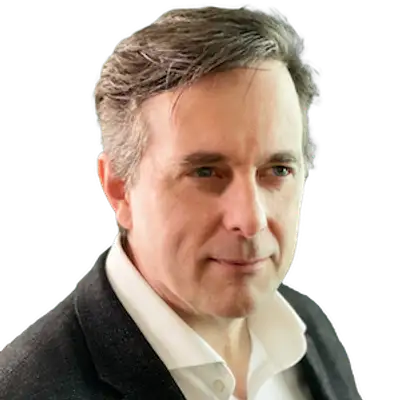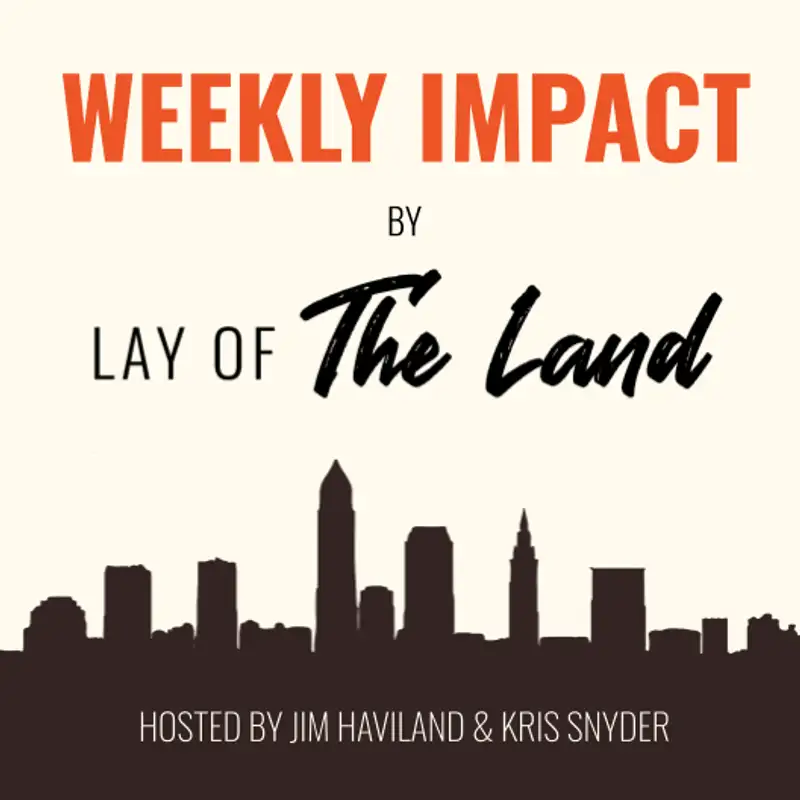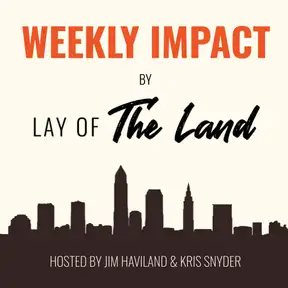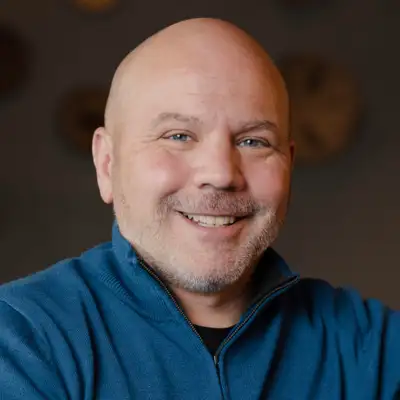7-8-24 Forward Hospitality and Creative Infrastructure
Jim Haviland (00:00)
Hello, everybody. Welcome to the week. This is Lay of the Land weekly impact for the eighth of July, 2024, a short week, but plenty to talk about. I'm Jim Havilland. And we, Kris, we are in different different time zones today. Where are you at?
Kris Snyder (00:11)
I'm Kris Snyder.
I'm in Denver today.
Jim Haviland (00:18)
All right, fair enough. I'm here at my home in Cleveland. Short week last week, but we did have a great podcast drop. So this was Mitchell Vargo, Forward Hospitality Group, Holy Mackerel. I really had no idea about Forward Hospitality because I'm old. I don't really do this stuff anymore. But there's a lot of great stuff in there.
Kris Snyder (00:39)
Yeah. Well, Jim, I had the opportunity. Mitchell came into the Impact Leadership Center into our podcast studio, right? So I got to meet him when he came in. And again, this was months ago because we're running a little bit of backlog on it. And I had heard, I didn't know Mitchell, but I knew some of the other partners they talks about in the podcast. And when I say no, it's kind of like third party type of no, right? Including Ponte, the chef.
Jim Haviland (00:45)
Yeah.
Sure.
Yeah.
Kris Snyder (01:02)
So, but it was really cool to hear the breakdown of the other brands beyond for the kind of a nightclub life that they've brought forward to the table as well, right? And so kind of cool concepts from kind of a Nashville vibe all the way into kind of a seventies vibe of, you know, good night, John Boy, that was fun.
Jim Haviland (01:20)
Yeah, and I love the fact that they really take a portfolio approach to it. I mean, if you look at all the things that go into it, and Jeffrey does a good job of this from a product perspective, they're managing a portfolio of brands and trying to cover different parts of the ecosystem to make sure that they got good coverage of all the things that need to go on and looking at how people behave like, you know,
Bachelorette's going to Nashville. And it's a great way. He's like, well, how do we solve that problem? How do we give people that kind of option but here in Cleveland or in any of the other markets are starting to operate? So really, really fascinating stuff. Kris, I got a shout out to the operations. He gives a lot of credit to their ability to execute, the ability to have a great culture, to make sure that everyone's on track to EOS and having healthy accountability. And asking the question all the time, one of my favorites, how do we measure that? How do we measure that?
Kris Snyder (01:46)
you
Well, there's a joke and I'm going to do it. It's like a joke goes like, how do you know someone's from Texas?
Jim Haviland (02:21)
How's that? Right.
Kris Snyder (02:22)
They tell you, they tell you their, like, if you ever made a text, then they're gonna tell you, right? And one of the things I love about people who are having success with a business operating system like EOS is they will tell you because they've appreciate what they had, what they didn't have before, which is an accidental, unintentional experience. And when they first made the commitment to change, something was driving that change, right? And they wanted to be better. And then they put the effort, they put the energy into an operating system like EOS.
Jim Haviland (02:32)
Yes.
Yeah.
Kris Snyder (02:51)
So I think you and I were kind of riffing before this and we started looking through by just putting a simple search into the Lay of the Land podcast website, all the different folks that mentioned EOS and other business operating systems, right? And it was just a ton.
Jim Haviland (03:00)
Yes.
That's right. And Kris, I like that. And here's the thing. So like we always say, everyone has an operating system. Until you have an intentional one, you've got an accidental one. If you want intentional results rather than accidental results, you should have an intentional operating system. But beyond that, I got to say, we make claims that you're more likely to be successful. It's almost impossible to go out of business for the unforced errors.
And that's everyone feels that once they come through it. That's why they tell you because they suddenly realize my great idea didn't have a great way of getting to success without the optimism, without the intentionality of that. And I think that's right. I mean, if you talk to any of these people, we go down the list, Jim Shock, Mary Cowan,
Nick Datis, you know, gosh, I was talking to Kyle Maggard over the weekend. He's intending to get one gun because he sees it, he feels it, he wants to get there. Obviously, you and Gerald and Meg, who've all been on the podcast, Michael Serpilla, gosh, I mean, it's really every third one, right?
Kris Snyder (04:13)
Right, and even folks who don't have the language for it, right, they've been picking up pieces of it, right? Like, you'll hear them talk about core values as an example, right? They'll talk about, they'll use language from like good to great. They'll talk about a b -hag, right? And so they'll have aspects of it. And that's all really healthy, right? To use some of those tools, I think it's what the operating system for everyone who doesn't know,
Jim Haviland (04:25)
That's right.
Yes.
Kris Snyder (04:42)
a business operating system like EOS pulls it all together, right? And there's a bunch of them out there.
Jim Haviland (04:46)
Right. Yeah, I mean, obviously I prefer 90 OS. That's the one that I teach. But it's really our advocacy folks, if you're wondering, you got to get yourself an intentional operating system. We would love to help you with that. But it's not really my advocacy, my heartfelt advocacy is you have to choose. Choose an operating system to follow. Eventually, you're going to have your own. Eventually, you're going to be Amazon and have your own operating system, or you're going to be a
any of the major companies that all have, I got books on them, like people that have been successful, they get to that place where, hey, I'm gonna write down my operating system because that's how we got there. But they all have the same components to them. That's the thing, we call them different things, but they all have the same.
Kris Snyder (05:30)
Well, Mitchell did a lot of things well, but sharing his kind of healthy accountability that the operating system brings, right? And that was, you know, how many people hate meetings is probably the majority of entrepreneurs and founders because they don't find the utility in them. But you could even hear when Mitchell was describing their meetings, highly intentional, highly metric driven, highly accountable, right? Like, and that's a performance moment. And you can see that even level.
Jim Haviland (05:36)
Yes. Right.
Absolutely.
Yeah.
Kris Snyder (05:56)
I don't know how much was there in his life before they started implementing EOS, but you could see that and how he talked even about kind of his own, you know, frameworks and structures personally, and kind of navigating that work -life balance harmony types of moments.
Jim Haviland (06:05)
Yeah!
Of course, for my clients, the same thing. I mean, like getting to the place where we talk about intentionality with our time is the most. And that, by the way, all the research says that's how you get to be happier. When you have active, meaningful downtime, not just scrolling, not just watching TV, but active recuperation and knowing what you're doing, things that actually help your body and make you feel good, that becomes a positive cycle that you build upon. The other thing with, you know, was, you know,
Kris, looking at this, is this part of what we would call entrepreneurial infrastructure? Like to have the party plays, such as the party plays, but like entertainment, there's things we can go do that are active leisure opportunities. Going to watch live music is not like watching television. You're actually in it, you're participating in it. Going to interesting places, meeting interesting people for interesting meals, having new experiences, that's all.
things that the creative class does and likes to do. So is this part of that infrastructure?
Kris Snyder (07:15)
Yeah, I know. I think it for sure is. And I know sometimes, whether it's the, you know, our football stadium that's up in the conversation right now, or the basketball teams, baseball and the Rock and Roll Hall of Fame. And these are still just attributes that the community needs. Like, you know, last week took my girls to go see Back to the Future, you know, and our theater district is still really strong, right? And you but you need those things. And
the restaurants around the theater district. We went to a restaurant called District, which was actually the first time there, it was really good. But you need that stuff, right? Because you're gonna create a community and entrepreneurs, they do have lives outside of work. What are they gonna do that's entertaining that keeps them here? And I think that's a really important part.
Jim Haviland (08:03)
Yeah, so both of you, both of you and I had our experiences coming up through Chicago. I was in Seattle and I know you live in the work from anywhere world now. But I think the thing I see in it is you have to create those inspirational moments as a natural part of what goes on. So just like having a healthy culture, you know, part of the healthy entrepreneurial culture is things that new experiences and challenges like I can, I can take, take advantage of that are not a thousand miles away. I mean, when I was in Chicago, I mean,
Yeah, have a good one.
It was a destination city. People would move there, you know, one way ticket city. And you would find that there's all this stuff you could do in advertising or in music or in art and in, there was an active lifestyle along the coast. I mean, there's so many things that you'd make create that high -finite lifestyle that like, how do I identify myself and have lots of pieces to it that make it part of what was true. And then the same thing in Seattle. Seattle was, I was there at an amazing time. I was there during the 90s. So, you know, grunge rock came out of that.
Starbucks was still new when I was there. All the streaming services came out of there, Disney and whatnot. And then, of course, Amazon. And all of these took a lot of creativity. And a lot of the same people were doing a lot of these same things. They were crossing over between these places and parts of the world and taking that creativity that they formed in this area and placing over here. And I think that's one of the things I think
Jefferson did a great job of kind of uncovering that infrastructure, that creative infrastructure.
Kris Snyder (09:36)
Yeah, it was got mentioned, the Forbes under 30 summit that happened here in Cleveland. So it sounded like Mitchell was there. And we had obviously machine gun Kelly's boy was his publicist or I have to think about the episode, but they were his partners. Yeah. And so I should, I should have looked that up ahead of time, but, but it was really cool to think about how many people that would Jeffrey went to the summit.
Jim Haviland (09:42)
Yes.
Yeah, one of his partners in his entrepreneurial ventures, yeah.
Kris Snyder (10:05)
have made their way to the podcast, which is really what we want. We want people to be doing really cool stuff and having venues like Forbes under 30 and Cleveland, and then discovering, uncovering, and connecting new aspects of the community.
Jim Haviland (10:08)
Right.
Right. Well, I mean, I think it's one of the things that's always been in the way is in Cleveland, there's not done a great job of promoting that kind of stuff. But the more we feel that those things happen here, that that that's just a natural part of being who we are. I mean, like, you know, the kind of public library and that being an innovative place to do things. And, you know, we've got all of this support for creating new businesses like Jumpstart and Magnet that are going to be on the show and the funds like, you know, North Coast Ventures.
Even Justin Bibb was on the show and he's very entrepreneurial. He's really thinking about what are the innovations we can do to make cities better, not just Cleveland focused, not like this, but like if we look at all the opportunities, what are the things that people are doing that we can bring back here and approach? I think that's the most exciting part about this, that kind of discovery that there is an infrastructure we're building here that isn't just about the mistakes we've made. And I think they talked about that in the Justin Bibb show, like.
building a building for innovation to happen. Is that the best way to spend the money, Kris? Or I don't know if you got a feeling on that, but we're good at that. We can raise the money to go do great things, but it's not, we don't necessarily spend it in a great way. We have a plan, but we spend all the dough on the building.
Kris Snyder (11:21)
Yeah.
Yeah. Well, we've made plenty of mistakes as a community. I think now we continue to learn and figure out how to move forward on it. I think that's the best part.
Jim Haviland (11:42)
And that's what we teach our clients, right? It's like, hey, it's only failure if you give up, you know, it's like, just keep back and go, okay, what did we learn? Okay. You know, spend that money somewhere else. So, all right. Chris, Kris, else do we need need talk about this week?
Kris Snyder (11:57)
I think that's it, Jim, that's our weekly impact.
Jim Haviland (11:59)
short week. All right. All right, everybody. Thanks for joining us for Weekly Impact. We'll be back again next week with a review of the Lay of the Land and a bunch of other stuff that we chat about.
Creators and Guests



